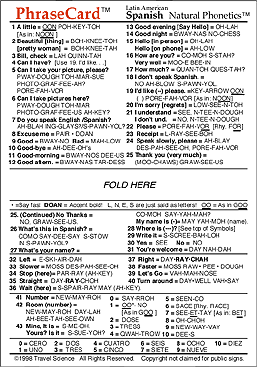Natural Phonetics™
 |
Here is Mary, an American
tourist, lying on the beach at Monaco looking over her French PhraseCard™
Sure, she has a French phrasebook and dictionary in the straw bag. (You never know
when you might have to say useful phrases like "My aunt broke her left arm falling
off a horse after she divorced my uncle.")
|
|
Even
Mary, who happens to have an IQ of 130, was glad she didn't have to work too much at
learning a little French. After all, this was supposed to be a vacation after giving
that paper on Quantum Mechanics at the International Physics Conference. Ah,
sometimes life has pleasant little surprises in store. She didn't have to study a
lot of phonetic pronunciation rules. She just had to read some English words that came out
sounding like French. What magic!
Why is learning a few words and phrases of
another language so painful? It should be, well, almost fun!
So what is unique about Natural Phonetics™? Let's find out! |
The little PhraseCard™ was
a
pleasant surprise.
 |
|
|
Here are some phonetic examples that you might find in phrasebooks to show an
English-speaking person how to say "Please" (S'il vous plaît ) in French.
Somewhere in there is our Natural Phonetics™
1 Seel voo plei
2 sil voo pleh
3 seel voo play
4 seel-voo-pleh
5 SEEL-VOO-PLAY
[Rhymes with. TOO ] |
 |
Which ones look pretty easy
to pronounce? We'd pick 3 and 5. But 5 leaves no doubt as to how "VOO"
should sound as they say it rhymes with "TOO". (Yes, that's our Natural
Phonetics™.) Sometimes people who see phonetics will forget the rules, like
"oo" should sound like the "oo" in "TOO" and not like
"OH". (I'm not sure Martha. Maybe they have two "o's" because they
want us to stretch out the sound like "Ohhhhhh" ) Did you forget the rule? How
many pronunciation rules do you remember from your school days?
Our concept is to make sure you are understood the first time you
look at a phonetic and say it without having to study the phonetic and
learn phonetic pronunciation rules. If we can't express the sound exactly
using English words or made up words that are easy-to-pronounce, we will
at least make you understood. Phonetics like the example "pleh"
above are hard for most Americans to pronounce because we do not have any
common English words that have the "leh" letter
combination. Sure, you can explain, from a linguist's
point of view, how it should be pronounced and show examples, but this
doesn't always work.
 |
The bottom line is not to
make sweat break out on your forehead! You really do want to be understood the very
first time. Maybe not perfectly, but nevertheless understood. Most people can improve
their pronunciation when they hear it said by a native speaker. There is nothing to
fear here except fear itself! People you are speaking to will never laugh at you for
trying, and 999 out of 1,000 native speakers will be glad to help you. |
Phonetics should reduce
doubt! Reduce anxiety! Reduce fear! If it is a made up word that might
be mispronounced, give them some hints. Like "Rhymes with" or "As in"
or "say bet without the 't'. And if a foreign sound happens to sound
like a single letter of the English alphabet (as an American would pronounce it) by all
means use a single letter like "A' or "E". But remind them that
"A" is said "A" and not "ah" and don't use a single letter
if there is a common English word. Use "GEE" and not "G" or
"BEE" and not "B". OK, even we have a special symbol -- the dot
· that
we use to show when two phonetic
syllables (NEW ·WE) need to
be said very fast so it sounds like one syllable. Sometimes that's the best way to
capture the sound!
| Finally, there are dialects. You
may not be understood everywhere, in every city and village. OK,
show them the phrase you are trying to say, then write down the way it sounds using
ordinary English words. The next time you read your phonetics, you will be
understood. Life is simple. Learning languages can be simple, too. Especially
if you are a traveler learning just a few words and phrases. |
 |
What makes a great
PhraseCard™? Sprinkle in some phrases that will come in handy like "Can I take
pictures here?" and "How much?", list the words and phrases in
alpha-logical* order, include the written text of the foreign language as a fallback
position. Then put everything on a pocket-sized card that fits easily into a shirt
pocket or wallet. Wow! No batteries, no hassle, no learning curve. Just a wonderful little
PhraseCard™. I knew I could. I knew I could. I knew I could.
*alpha-logical order is a term we invented. Things are listed in alphabetical
order except where it is more logical to group them in another order. Like - "Good
morning, good afternoon, good evening" instead of "Good afternoon, good evening,
good morning."
 |
No publisher
of phonetics is perfect. And we're not perfect either. Some of our phonetics won't work
well and should be changed. We have periodic reviews and an on-going test program to
improve our phonetics. But ultimately it comes down to what works for average travelers.
Tell us the ones that need to be improved. Or maybe we need to add another phrase we
overlooked. There's a feedback button on every page of this website. We listen to users
because we want these to be the best phonetics and selection of basic words and phrases in
the world! We can only do it with your help!
|
And what ever happened to
Mary? She got her tan and a man! We can't say learning a few French phrases was what
attracted Pierre to her. Maybe it was the way she smiled when she said
"good-day" in French. And he said "Let me teach you some more French
phrases." (He spoke English with a wonderful French accent!) She replied, "MAIR-SEE
-BOH-COO". [Rhymes with AIR and TOO ]. And so they went out to
his small yacht and she had her first French language lesson that very afternoon.
Later, after dinner, the moon came up and there was a gentle
breeze and she learned many other wonderful French words before
returning to her hotel at 2200 European Time (10 PM for Americans).
Here is a video of them skiing at St. Moritz on their honeymoon taken by
Claude, the best man. We can imagine other stories. If you have a
true story involving languages, please send it to us by selecting
Story on the Feedback Form. |

It's not clear which
is Mary and which is
Pierre as they decided
it would be fun to
wear matching outfits! |
|
|






